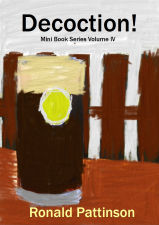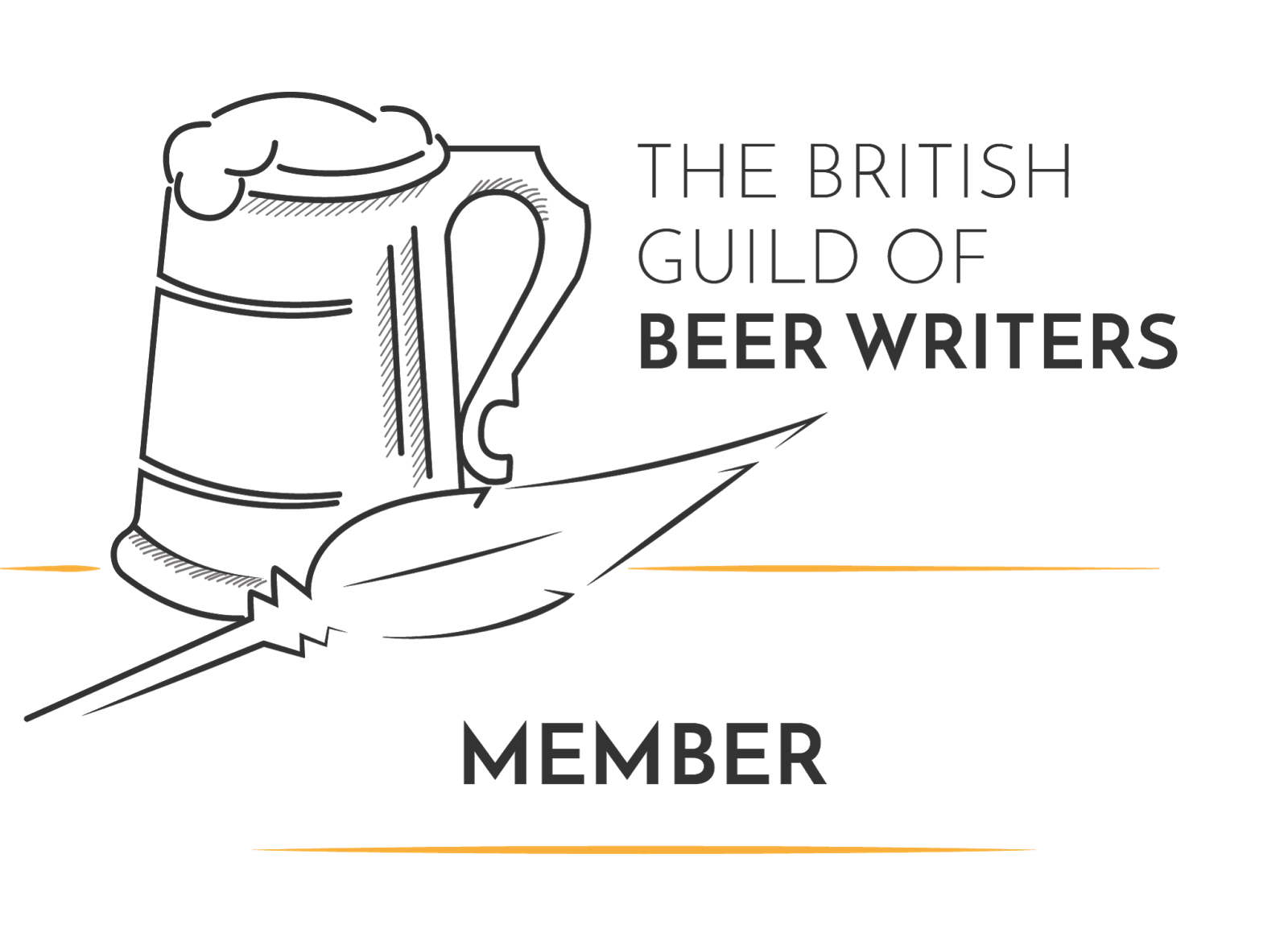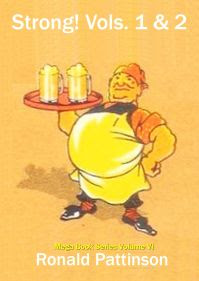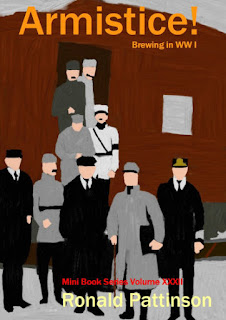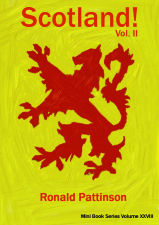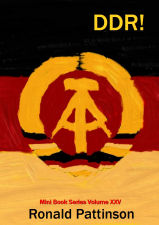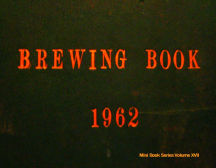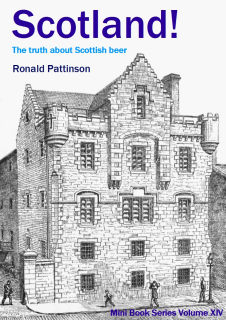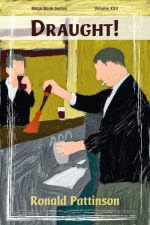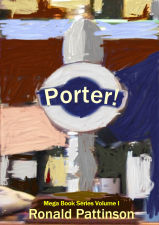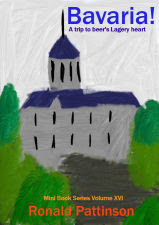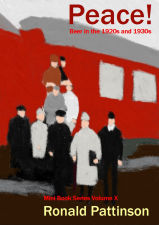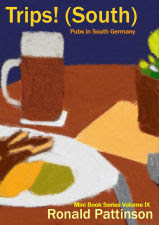Monday 31 May 2010
Burned!
Why so crispy? This was salvaged from the burnt-out wreck Of Barclay Perkins after the fire in 1832.
This is a Porter log. For some reason, the brewhouse name at Barclay Perkins was TT. As you can see, they were early adopters of black malt. That's what the Rd means in that column on the left. OG 1060, FG 1016.
Sunday 30 May 2010
Notes on Changes in Trade
Whitbread kept a spreadsheet of their sales. In old-fashioned pen and ink form. I wish I'd had time to photograph it all. The first few pages are text. Entitled "Notes on Changes in Trade".
Here's a snippet:
For the lazy:
This is what happened when there was a sudden rise in beer duty. In some cases, the prices went up, in others the gravity went down. Net result: less tax income for the government.
This was the end of the road for Whitbread's KK and Stout. Beers that had been around since the early 19th century.
I don't know what XA was. I haven't seen it in their brewing records. Weird.
The clear ale stuff is, I believe, when various bottlers went over to carbonated rather than naturally-conditioned bottled beer.
Here's a snippet:
For the lazy:
July 1931 Liverpool started clear ale.
July 1931 Birkenhead started clear ale.
July 1931 Manchester started clear ale.
Sept 1931 Economy Budget. Duty increased by 31/- per barrel
Sept 1931 W & Co. [Whitbread & Co.] Bottled Beer prices increased by 1/- per doz. pints; 6d per doz. half pints; & 8d per crate, except LS & LOS which are not changed in price, but the gravity reduced from 1055º to 1047º
Sept 1931 Bass Bottled Beer increased by 1/4d per doz. pints; 8d per doz. half pints
Sept 1931 Guinness Bottled Beer increased by 1/4d per doz. pints; 8d per doz. half pints
Sept 1931 Cask Beer. X.A. started at 118/- per barrel. K.K. & Stout withdrawn. Replaced by X.X.X. & L.S.
This is what happened when there was a sudden rise in beer duty. In some cases, the prices went up, in others the gravity went down. Net result: less tax income for the government.
This was the end of the road for Whitbread's KK and Stout. Beers that had been around since the early 19th century.
I don't know what XA was. I haven't seen it in their brewing records. Weird.
The clear ale stuff is, I believe, when various bottlers went over to carbonated rather than naturally-conditioned bottled beer.
Saturday 29 May 2010
News from the archives
I'll tell you this. Because when I tried to talk about to my wife and kids they immediately turned into zombies. Or maybe they were just sleeping with their eyes open.
I got two days in the archives this week. But I only managed to take 1,700 photos. Here's one I particularly like:
It's from a notebook the gives details of the Barclay Perkins Lager brewery. But also has stuff about other bits of the brewery. Including the above diagram of fermenting vessels.
I got two days in the archives this week. But I only managed to take 1,700 photos. Here's one I particularly like:
It's from a notebook the gives details of the Barclay Perkins Lager brewery. But also has stuff about other bits of the brewery. Including the above diagram of fermenting vessels.
Friday 28 May 2010
Mackeson adverts
When I visit the archives there are always a few minutes to fill before the first batch of documents appears. I use them to search their paper catalogues.
I'm always well-prepared, because my time is so short. And every minute I save is one extra minute in the Gunmakers. So I have a whole wodge of request forms already filled in. But, because life would be bland dish without the spice novelty, I fill in one set there. For non-brewing records of some sort.
I'd never looked at anything in the Whitbread archive other than brewing logs. There are so many, I still haven't got anywhere near through the lot. A right bunch of hoarders, Whitbread. Their archive is huge. Including such things as newspaper clippings of their newspaper ads. I picked the book with ads from more exotic countries.
Like the Philippines.
Funny. I always thought of Mackeson as a drink for grannies. Not fit young women.
I'm always well-prepared, because my time is so short. And every minute I save is one extra minute in the Gunmakers. So I have a whole wodge of request forms already filled in. But, because life would be bland dish without the spice novelty, I fill in one set there. For non-brewing records of some sort.
I'd never looked at anything in the Whitbread archive other than brewing logs. There are so many, I still haven't got anywhere near through the lot. A right bunch of hoarders, Whitbread. Their archive is huge. Including such things as newspaper clippings of their newspaper ads. I picked the book with ads from more exotic countries.
Like the Philippines.
Funny. I always thought of Mackeson as a drink for grannies. Not fit young women.
Thursday 27 May 2010
Indian Pale Ale
Ever wondered what old-time American IPA was like? Go on. You must have. Your wish has been granted. Sort of.
In Bill Schwarz's papers there were a couple of other recipes. Most notably, one for something called Indian Pale Ale. There's no indication of a date or even of the brewery. My guess is that it's from around the same period as the dated items. So 1940's.
Take a look:
Nice detailed mashing instructions. But unfortunately there's one piece of information missing: the hopping.
The gravity is given: 17 Balling. Which is around 1068º. Quite a bit stronger than the Lager. Could explain why Americans think IPA is a strong beer.
In Bill Schwarz's papers there were a couple of other recipes. Most notably, one for something called Indian Pale Ale. There's no indication of a date or even of the brewery. My guess is that it's from around the same period as the dated items. So 1940's.
Take a look:
Nice detailed mashing instructions. But unfortunately there's one piece of information missing: the hopping.
The gravity is given: 17 Balling. Which is around 1068º. Quite a bit stronger than the Lager. Could explain why Americans think IPA is a strong beer.
Wednesday 26 May 2010
Random brewer of the week : Beasley
Hey, know what would be fun? Like really, really fun. Because I know how much you like tables. What if I had a table of beers from a random brewery once a week? It's win - win. You get entertained, I don't have to think up new topics to discuss. (You should try finding ideas for 500 posts each year.)
For the inaugural random brewer I've picked Beasley. Why? It's random, you moron. There's not supposed to be any reason behind it. OK, this is how the selection process went. I opened my Mega Gravity Table, the version sorted by brewery name. I started at the top and Beasley was the first suitable brewery I came across. Ah, the anguish of the creative process.
The Beasley brewery was in Plumstead, South London. It was founded in 1845. And bought and closed by Courage in 1963. Unfortunately, Courage didn't bother depositing any of their brewing records in the archive. Bastards. So all my infor on their beers comes from Whitbread and Truman. Ironic, eh?
Arsenal Stout. Lucas would like that one. He's a Gonner. Dark Brown Ale. That has a certain ring to it, too.
For the inaugural random brewer I've picked Beasley. Why? It's random, you moron. There's not supposed to be any reason behind it. OK, this is how the selection process went. I opened my Mega Gravity Table, the version sorted by brewery name. I started at the top and Beasley was the first suitable brewery I came across. Ah, the anguish of the creative process.
The Beasley brewery was in Plumstead, South London. It was founded in 1845. And bought and closed by Courage in 1963. Unfortunately, Courage didn't bother depositing any of their brewing records in the archive. Bastards. So all my infor on their beers comes from Whitbread and Truman. Ironic, eh?
| Beasley beers | |||||||||||
| Year | Beer | Style | Price | size | package | Acidity | FG | OG | Colour | ABV | attenuation |
| 1922 | KK | Strong Ale | 9d | pint | draught | 1014.4 | 1056.6 | 5.49 | 74.56% | ||
| 1922 | London Stout | Stout | 11d | pint | bottled | 1009 | 1041.1 | 4.17 | 78.10% | ||
| 1922 | MA | Mild | 5d | pint | draught | 1010.4 | 1034 | 3.05 | 69.41% | ||
| 1922 | MA | Mild | 5d | pint | draught | 1007.6 | 1030.2 | 2.93 | 74.83% | ||
| 1922 | PA | Pale Ale | 11d | pint | bottled | 1009.5 | 1040.7 | 4.05 | 76.66% | ||
| 1922 | PA | Pale Ale | 7d | pint | draught | 1011.9 | 1035.3 | 3.03 | 66.29% | ||
| 1922 | PA | Pale Ale | 7d | pint | draught | 1008.6 | 1044.1 | 4.62 | 80.50% | ||
| 1922 | Stout | Stout | 8d | pint | draught | 1017.4 | 1054 | 4.74 | 67.78% | ||
| 1927 | Double Brown | Brown Ale | 8d | pint | bottled | 1010.1 | 1047.2 | 4.83 | 78.60% | ||
| 1931 | Strong Ale | Strong Ale | 8d | pint | draught | 1048.9 | |||||
| 1932 | Strong Ale | Strong Ale | 8d | pint | draught | 1048.4 | |||||
| 1933 | Strong Ale | Strong Ale | 7d | pint | draught | 1048.1 | |||||
| 1935 | PA | Pale Ale | 6d | pint | bottled | 0.06 | 1008.8 | 1037 | 3.66 | 76.22% | |
| 1936 | PA | Pale Ale | 6d | pint | bottled | 0.05 | 1007.4 | 1036.6 | 3.79 | 79.78% | |
| 1940 | Pale Ale | Pale Ale | 7d | pint | draught | 1042.5 | |||||
| 1940 | Strong Ale | Strong Ale | 8d | pint | draught | 1048.4 | |||||
| 1940 | X | Mild | 6d | pint | draught | 1034.5 | |||||
| 1941 | Pale Ale | Pale Ale | 10d | pint | draught | 1042.1 | |||||
| 1944 | Dark Brown Ale | Brown Ale | bottled | 0.04 | 1012.4 | 1033.1 | 12 + 40 | 2.67 | 62.54% | ||
| 1944 | Pale Ale | Pale Ale | bottled | 0.05 | 1006.4 | 1032.2 | 18 | 3.35 | 80.12% | ||
| 1946 | Dark Brown | Brown Ale | 1/- | pint | bottled | 0.07 | 1009.5 | 1029.5 | 13 + 40 | 2.59 | 67.80% |
| 1946 | Pale Ale | Pale Ale | 1/- | pint | bottled | 0.08 | 1005.6 | 1030.3 | 19 | 3.21 | 81.52% |
| 1947 | Brown Ale | Brown Ale | 1/- | pint | bottled | 0.05 | 1009.3 | 1029 | 12 + 40 | 2.55 | 67.93% |
| 1947 | Brown Ale | Brown Ale | 1/- | pint | bottled | 0.08 | 1007.7 | 1030 | 11 + 40 | 2.89 | 74.33% |
| 1947 | Pale Ale | Pale Ale | 1/- | pint | bottled | 0.05 | 1005.5 | 1030.1 | 21.5 | 3.20 | 81.73% |
| 1947 | Pale Ale | Pale Ale | 1/1d | pint | bottled | 0.07 | 1005.1 | 1030.3 | 20.5 | 3.27 | 83.17% |
| 1949 | Pale Ale | Pale Ale | 14d | pint | draught | 1033.1 | 18 | ||||
| 1950 | Ale | Mild | 12d | pint | draught | 1031.4 | 56 | ||||
| 1950 | Pale Ale | Pale Ale | 16d | pint | draught | 1035.5 | 28 | ||||
| 1952 | Pale Ale | Pale Ale | 17d | pint | draught | 1037.2 | 30 | ||||
| 1953 | Arsenal Extra Stout | Stout | 1/2d | half pint | bottled | 0.05 | 1022 | 1049.2 | 1 + 21 | 3.50 | 55.28% |
| 1953 | Coronation Ale | Brown Ale | 1/2d | half pint | bottled | 0.05 | 1008.6 | 1043.1 | 21 + 40 | 4.49 | 80.05% |
| 1953 | X | Mild | 13d | pint | draught | 1031.5 | 116 | ||||
| 1953 | X | Mild | 13d | pint | draught | 1031.2 | 116 | ||||
| 1959 | Pale Ale | Pale Ale | 10d | halfpint | bottled | 0.03 | 1006.8 | 1031.1 | 26 | 3.15 | 78.14% |
| 1960 | Arsenal Extra Special Stout | Stout | 14d | half pint | bottled | 0.04 | 1017.7 | 1040.7 | 400 | 2.88 | 56.51% |
| 1960 | Bitter | Pale Ale | 15d | pint | draught | 0.05 | 1004.5 | 1034.3 | 35 | 3.72 | 86.88% |
| 1960 | London Stout | Stout | 10d | half pint | bottled | 0.02 | 1010.6 | 1032.8 | 325 | 2.77 | 67.68% |
| Sources: | |||||||||||
| Whitbread Gravity Book | |||||||||||
| Truman Gravity Book | |||||||||||
Arsenal Stout. Lucas would like that one. He's a Gonner. Dark Brown Ale. That has a certain ring to it, too.
Tuesday 25 May 2010
Price fixing 1943
An illegal cartel. That's what they'd call it now.
These are the prices per hectolitre of draught beer:

Translation:
These are the breweries that agreed to it:
They'd never dare pull such a trick nowadays, would they?
Almost forgot the beer types featured. Beer styles, sorry. Must get my terminology right. Lager, Pilsener, Münchener, Stout. Interesting mix.
I must share the same brewers' proposals for introducing Märzen as a spring seasonal beer. Fascinating stuff. But I can't be arsed tot translate it at the moment. I'll do it later. Remind me if I forget. It's great stuff.
These are the prices per hectolitre of draught beer:

Translation:
"2nd: Article 1.A of Chapter VII is replaced by:
Beer prices per barrel
----------------------
1.A The binding prices for member breweries for the beers mentioned in Chapter VI for draught beer are as follows:
Lager 24.80 guilders per hl
Pilsener or Münchener 34.65 guilders
Stout 51.30 guilders
with the understanding that the prices of the other types of beer mentioned in Article 1 of Chapter VI will be agreed on later, when it is necessary.
3rd: Article 3 of Chapter VII is read as follows:
Agent discount.
---------------
3.A this is:
per hl Lager a maximum of 4.15 guilders
per hl Pilsener or Münchener a maximum of 4.15 guilders
per hl Stout a maximum of 4.15 guilders
with the understanding that the discounts of the other types of beer mentioned in Article 1 of Chapter VI will be agreed on later, when it is necessary."
These are the breweries that agreed to it:
They'd never dare pull such a trick nowadays, would they?
Almost forgot the beer types featured. Beer styles, sorry. Must get my terminology right. Lager, Pilsener, Münchener, Stout. Interesting mix.
I must share the same brewers' proposals for introducing Märzen as a spring seasonal beer. Fascinating stuff. But I can't be arsed tot translate it at the moment. I'll do it later. Remind me if I forget. It's great stuff.
Monday 24 May 2010
Kilderkin logo
Lexie has drawn me a logo for my publishing empire, Kilderkin.
Take a look:
You can buy my books here. Go on. Buy a couple. Then the kids can have shoes.
Take a look:
You can buy my books here. Go on. Buy a couple. Then the kids can have shoes.
Sunday 23 May 2010
Beer Ignorance
Unwisely, I've looked at some more of the Beer Genie site. Oh dear. Oh dear.
One section is called "Beer Knowledge". Beer Ignorance would be more accurate. Here's one of the best bits:
Yeah, Arthur Guinness used roast barley. Despite the fact that it wasn't invented until after his death. And if the excisemen had caught him with unmalted barley on his premises he would have received a big fine and possibly had his brewing equipment confiscated. Beers brewed in Britain and Ireland were all-malt by law. Why do people keep repeating this bollocks? Guinness only started using roast barley in the 20th century. Well after some London breweries, like Barclay Perkins.
Oh, and dry "Irish-style" Stout only appeared in the 1950's. But who cares about boring things like facts?
The irony is that BBPA publications (and those of its predecessor the Brewers' Society) have provided me with many of the facts that I use. They should get the writers of their website to look through some old editions of the Brewers' Alamanack.
One section is called "Beer Knowledge". Beer Ignorance would be more accurate. Here's one of the best bits:
"Stout
A drier, darker, fuller-bodied and, some would say, stouter descendant of porter. Born in London as "stout porter" and raised in Ireland, it soon lost its surname and become synonymous with a brand founded in 1759 by Arthur Guinness. Having drunk imported porters and stouts from Britain, the Irish brewer decided to brew his own "dry Irish" version using unmalted roasted barley instead of dark malts - producing a more acrid, astringent and thicker interpretation. London Stouts, in contrast, were made with 100% malt grist including the original brown malt and with no roast barley. When the British government imposed restrictions on malting and beer strength during the First World War, the dry Irish style stole a march on its British counterpart and, aided by both canny advertising and the missionary zeal of Irish Diaspora, it's become the benchmark for stouts."
Yeah, Arthur Guinness used roast barley. Despite the fact that it wasn't invented until after his death. And if the excisemen had caught him with unmalted barley on his premises he would have received a big fine and possibly had his brewing equipment confiscated. Beers brewed in Britain and Ireland were all-malt by law. Why do people keep repeating this bollocks? Guinness only started using roast barley in the 20th century. Well after some London breweries, like Barclay Perkins.
Oh, and dry "Irish-style" Stout only appeared in the 1950's. But who cares about boring things like facts?
The irony is that BBPA publications (and those of its predecessor the Brewers' Society) have provided me with many of the facts that I use. They should get the writers of their website to look through some old editions of the Brewers' Alamanack.
Labels:
barclay perkins,
BBPA,
Brewers' Alamanack,
Guinness,
Porter,
roast barley,
Stout
Saturday 22 May 2010
Barclay Perkins K Ales 1914 - 1931
More K Ales from Barclay Perkins.
I'm even more dubious about whether this table will work in a blog. Barclay Perkins just used too many different types of malt in their K Ales
Are you beginning to see any patterns? No? look bloody harder then.
There'll be another installment tomorrow. Most likely. Unless something more interesting comes my way.
I'm even more dubious about whether this table will work in a blog. Barclay Perkins just used too many different types of malt in their K Ales
| Barclay Perkins K Ales 1914 - 1931 | |||||||||||||||||||||||
| Year | Beer | OG | FG | ABV | App. Attenuation | lbs hops/ qtr | hops lb/brl | lbs hops | qtrs malt | dry hops (oz / barrel) | colour | pale malt | crystal malt | MA malt | SA malt | PA malt | no. 2 sugar | no. 3 sugar | caramel | glucose | other sugar | flaked maize | malt extract |
| 1914 | KK | 1073.1 | 1023.3 | 6.59 | 68.17% | 12.00 | 3.56 | 3095 | 258 | 8.00 | 30 | 12 | 138 | 36 | 2.22 | 18 | 24 | ||||||
| 1914 | KK | 1073.2 | 1023.5 | 6.57 | 67.83% | 11.97 | 3.61 | 2058 | 172 | 8.00 | 20 | 8 | 61 | 24 | 12 | 1.22 | 16 | ||||||
| 1914 | KK | 1073.1 | 1023.8 | 6.52 | 67.41% | 11.99 | 3.58 | 2062 | 172 | 8.00 | 20 | 8 | 31 | 61 | 24 | 12 | 1.22 | 16 | |||||
| 1915 | KK | 1073.0 | 1021.9 | 6.76 | 70.02% | 11.96 | 3.54 | 2057 | 172 | 8.00 | 20 | 8 | 92 | 24 | 12 | 1.33 | 16 | ||||||
| 1915 | KK | 1072.8 | 1022.2 | 6.70 | 69.56% | 12.98 | 3.90 | 1739 | 134 | 8.00 | 18 | 7 | 83 | 18 | 8 | 1.13 | |||||||
| 1915 | KK | 1072.9 | 1024.4 | 6.42 | 66.56% | 11.99 | 3.60 | 3094 | 258 | 8.00 | 30 | 12 | 138 | 28 | 26 | 2.22 | 24 | ||||||
| 1915 | KK | 1072.9 | 1023.8 | 6.49 | 67.32% | 11.95 | 3.67 | 2055 | 172 | 8.00 | 24 | 8 | 88 | 18 | 18 | 1.38 | 16 | ||||||
| 1916 | KK | 1072.9 | 1024.1 | 6.46 | 66.94% | 12.00 | 3.70 | 2064 | 172 | 8.00 | 53 | 8 | 59 | 18 | 18 | 1.38 | 16 | ||||||
| 1916 | KK | 1075.6 | 1024.4 | 6.78 | 67.76% | 12.00 | 3.78 | 2184 | 182 | 8.00 | 112 | 8 | 24 | 22 | 1.38 | 16 | |||||||
| 1916 | KK | 1075.7 | 1024.9 | 6.72 | 67.07% | 13.01 | 4.00 | 3513 | 270 | 12.00 | 168 | 12 | 44 | 22 | 1.22 | 24 | |||||||
| 1916 | KK | 1075.5 | 1025.5 | 6.62 | 66.25% | 12.01 | 3.75 | 3243 | 270 | 6.00 | 124 | 12 | 44 | 34 | 32 | 2.22 | 24 | ||||||
| 1917 | KK | 1075.5 | 1022.7 | 6.98 | 69.92% | 11.99 | 3.70 | 3236 | 270 | 6.00 | 102 | 12 | 18 | 24 | 2.22 | 24 | 24 | ||||||
| 1917 | KK | 1075.5 | 1025.5 | 6.62 | 66.25% | 11.99 | 3.73 | 3141 | 262 | 6.00 | 102 | 12 | 66 | 20 | 20 | 2.22 | 20 | 22 | |||||
| 1917 | KK | 1075.5 | 1026.0 | 6.54 | 65.51% | 12.99 | 4.08 | 3404 | 262 | 8.00 | 168 | 12 | 60 | 2.22 | 22 | ||||||||
| 1917 | KK | 1075.6 | 1022.7 | 7.00 | 69.96% | 13.00 | 4.01 | 3406 | 262 | 8.00 | 168 | 12 | 60 | 2.22 | 22 | ||||||||
| 1917 | KK | 1070.5 | 1020.5 | 6.61 | 70.92% | 11.00 | 3.19 | 1716 | 156 | 4.00 | 129 | 9 | 18 | ||||||||||
| 1919 | KK | 1061.2 | 1021.1 | 5.31 | 65.60% | 9.99 | 2.53 | 1419 | 142 | 4.00 | 64 | 58 | 6 | 38 | 14 | 14 | 1 | 12 | |||||
| 1920 | KK | 1061.4 | 1022.4 | 5.15 | 63.46% | 11.01 | 2.75 | 1564 | 142 | 4.00 | 22 | 6 | 68 | 6 | 28 | 1.25 | 12 | ||||||
| 1920 | KK | 1058.4 | 1018.0 | 5.34 | 69.17% | 11.00 | 2.62 | 2244 | 204 | 4.00 | 33 | 9 | 102 | 42 | 2 | 18 | |||||||
| 1920 | KK | 1055.4 | 1017.7 | 4.98 | 68.00% | 10.96 | 2.57 | 1425 | 130 | 6.00 | 21 | 6 | 35 | 34 | 22 | 1.25 | 12 | ||||||
| 1920 | KK (for bottling) | 1070.1 | 1025.5 | 5.90 | 63.62% | 12.67 | 3.76 | 494 | 39 | 8.00 | 66 | 5 | 3 | 20 | 8 | 0.34 | 3 | ||||||
| 1921 | KK (for bottling) | 1070.2 | 1024.5 | 6.05 | 65.10% | 13.00 | 3.78 | 507 | 39 | 8.00 | 2.25 | 7 | 20.75 | 6 | 0.32 | 3 | |||||||
| 1921 | KK | 1055.2 | 1016.1 | 5.18 | 70.89% | 9.47 | 2.08 | 1846 | 195 | 3.00 | 60 | 9 | 51 | 30 | 2.75 | 28 | 17 | ||||||
| 1921 | KK | 1055.2 | 1015.0 | 5.32 | 72.83% | 9.60 | 2.12 | 1037 | 108 | 3.00 | 76 | 17 | 5 | 47 | 16 | 1.5 | 14 | 9 | |||||
| 1922 | KK | 1055.2 | 1016.0 | 5.19 | 71.01% | 10.00 | 2.24 | 340 | 34 | 3.00 | 92 | 7 | 1.5 | 16.5 | 0.58 | 6 | 3 | ||||||
| 1924 | KKK | 1082.1 | 1028.0 | 7.16 | 65.90% | 14.00 | 4.75 | 560 | 40 | 8.00 | 108 | 8.5 | 2 | 23.5 | 6 | 1.47 | |||||||
| 1924 | KK (bottling) | 1070.3 | 1023.5 | 6.19 | 66.57% | 14.00 | 4.24 | 252 | 18 | 8.00 | 92 | 3 | 1 | 9 | 4 | 0.16 | 1 | ||||||
| 1924 | KK (bottling) | 1070.0 | 1019.0 | 6.75 | 72.86% | 14.00 | 3.95 | 644 | 46 | 8.00 | 92 | 8 | 2.75 | 24.25 | 8 | 0.5 | 3 | ||||||
| 1924 | KKK | 1082.4 | 1027.0 | 7.33 | 67.23% | 14.00 | 4.59 | 560 | 40 | 8.00 | 104 | 8.5 | 2 | 23.5 | 6 | 0.47 | |||||||
| 1924 | KKK | 1082.4 | 1028.5 | 7.13 | 65.41% | 14.00 | 4.71 | 560 | 40 | 8.00 | 104 | 8.5 | 2 | 23.5 | 6 | 0.47 | |||||||
| 1926 | KK | 1055.5 | 1015.0 | 5.35 | 72.96% | 9.00 | 1.91 | 387 | 43 | 3.00 | 92 | 11 | 2 | 10 | 10 | 0.89 | 6 | 4 | |||||
| 1928 | KKKK | 1078.6 | 1027.0 | 6.82 | 65.64% | 11.00 | 3.45 | 220 | 20 | 4.00 | 112 | 5.625 | 1.375 | 10 | 3 | 0.22 | 0.5 | ||||||
| 1928 | KKKK | 1078.4 | 1025.5 | 7.00 | 67.49% | 11.00 | 3.58 | 77 | 7 | 4.00 | 130 | 2 | 0.5 | 1.75 | 1.75 | 1 | 0.10 | 0.1161 | |||||
| 1928 | KK bottling | 1069.5 | 1020.0 | 6.55 | 71.21% | 11.00 | 2.97 | 429 | 39 | 8.00 | 90 | 7 | 2.25 | 6.75 | 12 | 8 | 0.56 | 3 | 1 | ||||
| 1928 | KK bottling | 1069.4 | 1021.5 | 6.34 | 69.04% | 11.00 | 2.99 | 429 | 39 | 8.00 | 96 | 7 | 2.25 | 6.75 | 12 | 8 | 0.56 | 3 | 1 | ||||
| 1928 | KKKK | 1079.0 | 1024.0 | 7.27 | 69.61% | 11.00 | 3.44 | 440 | 40 | 4.00 | 120 | 11.25 | 2.75 | 20 | 6 | 0.5 | 1 | ||||||
| 1929 | KKKK | 1078.8 | 1027.5 | 6.79 | 65.11% | 11.00 | 3.41 | 440 | 40 | 4.00 | 112 | 11.25 | 2.75 | 10 | 10 | 6 | 0.5 | 1 | |||||
| 1929 | KKKK | 1078.8 | 1025.5 | 7.06 | 67.66% | 11.00 | 3.38 | 440 | 40 | 4.00 | 112 | 11.25 | 2.75 | 10 | 10 | 6 | 0.5 | 1 | |||||
| 1929 | KKKK | 1078.7 | 1028.0 | 6.71 | 64.44% | 11.00 | 3.42 | 220 | 20 | 4.00 | 115 | 5.625 | 1.375 | 3 | 7 | 3 | 0.22 | ||||||
| 1931 | KK | 1055.7 | 1014.0 | 5.52 | 74.86% | 9.00 | 1.98 | 378 | 42 | 3.00 | 88 | 10 | 2 | 9 | 10 | 7 | 0.75 | 4 | |||||
| Source: | |||||||||||||||||||||||
| Barclay Perkins brewing records | |||||||||||||||||||||||
Are you beginning to see any patterns? No? look bloody harder then.
There'll be another installment tomorrow. Most likely. Unless something more interesting comes my way.
Labels:
1920s,
1930s,
Barcaly Perkins,
K Ales,
KK,
KKK,
KKKK,
London,
London Ale,
London Metropolitan Archive,
WW I,
X Ales
Subscribe to:
Posts (Atom)















